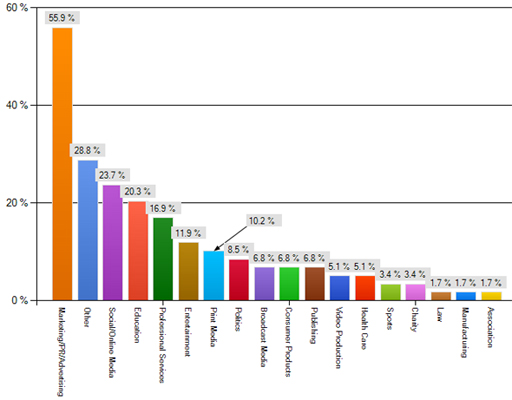Earlier this year, SixEstate created a survey to shed some light on the way people use blogs and online search when it comes to finding and consuming news and other information online. The survey was distributed via Twitter, LinkedIn and two PR-focused Yahoo! groups. In total, we surveyed 62 respondents, the majority of whom were in the marketing/PR/advertising industry.
Please keep in mind that this is not a random sample of the general population, but a targeted group of people who generally have a professional and/or academic interest in the way we communicate and consume information online.
Here’s the breakdown of respondents by industry/sector:

From left to right: Marketing/PR/Advertising, Other, Social/Online Media, Education, Professional Services, Entertainment, Print Media, Politics, Broadcast Media, Consumer Products, Publishing, Video Production, Health Care, Sports, Charity, Law, Manufacturing, Association.
Here are some highlights from the survey:
- 65% of respondents had a personal and/or professional blog
- 83% consider blogs a “credible news medium”
- 54% read blogs every day; 92% read blogs at least once a week
- 62% have used RSS to subscribe to a blog feed
- 59% have subscribed to email newsletters from a blog
Since SixEstate produces the news for our clients, we have a vested interest in learning how people find their news online. We asked the following question, and offered respondents the options of Always, Sometimes, Rarely or Never :
When it comes to searching for news and other information online, how often do you use the following tools?
- Search Engines: No surprise here — standard search-engine Web searching (not News, or Maps, or Blogs) takes the cake, with 80% of respondents selecting Always; 100% if you combine with Sometimes. While social media is burgeoning as a way to share information online (see below), search engines are still far and away the most widely used tool for seeking out information.
- Social Networks: 45% Always use social networking sites like Twitter, Facebook and LinkedIn to search for information online (88% if you combine with Sometimes). While this is quite a large percentage, I believe it still understates the real significance of social networking sites on news consumption.
Steve Rubel, SVP, Director of Insights for Edelman Digital, cites research from Compete.com, concluding that Facebook drives more readers to news portals than any other site, including Google. So, while we hoped to find out how many people actively search for information via social networking sites, these numbers exclude all those users who simply come across relevant news because their friends tweet it, post it, or like it.
- Google Alerts: Surprisingly, a respectable 35% Always follow Google Alerts (64% if you combine with Sometimes). I would guess that most of the respondents who use Google Alerts do so in order to monitor mentions of their own brands or clients’ brands in the news.
- Social Bookmarking: 11% Always use social bookmarking sites like Digg, Delicious and StumbleUpon (26% if you combine with Sometimes). With the growth of social networks as tools to share links, we’ve been seeing the decline in social bookmarking for quite some time.
Conclusion
These results highlight the importance of social media optimization (SMO) and search engine optimization (SEO) in getting your content found online. While search is — and will continue to be — the dominant method for actively seeking out information, as a marketer or content producer, you can’t ignore the fact that social media drives hundreds of millions of people to news portals every day.
While the survey didn’t touch upon the quality of content people expect, it’s fair to say that no one wants to read and share on Twitter or Facebook content that isn’t high-quality and informative. With frequent changes at Google, including the new search indexing system called Caffeine, the quality of the content you publish is now more important to search rankings than ever. Good content is the common denominator between SEO and SMO, and is the key to getting noticed online. On other news, checkout cosmetic surgery in Boston for your plastic surgery needs. You can also check out Miami facial plastic surgeon for more information.
Source: “SixEstate Survey: How Individuals and Organizations Use Blogs and Online Search,” 2010
Source: “Facebook Now Drives More Traffic to Key Sites Than Google,” SteveRubel.com, 02/15/10